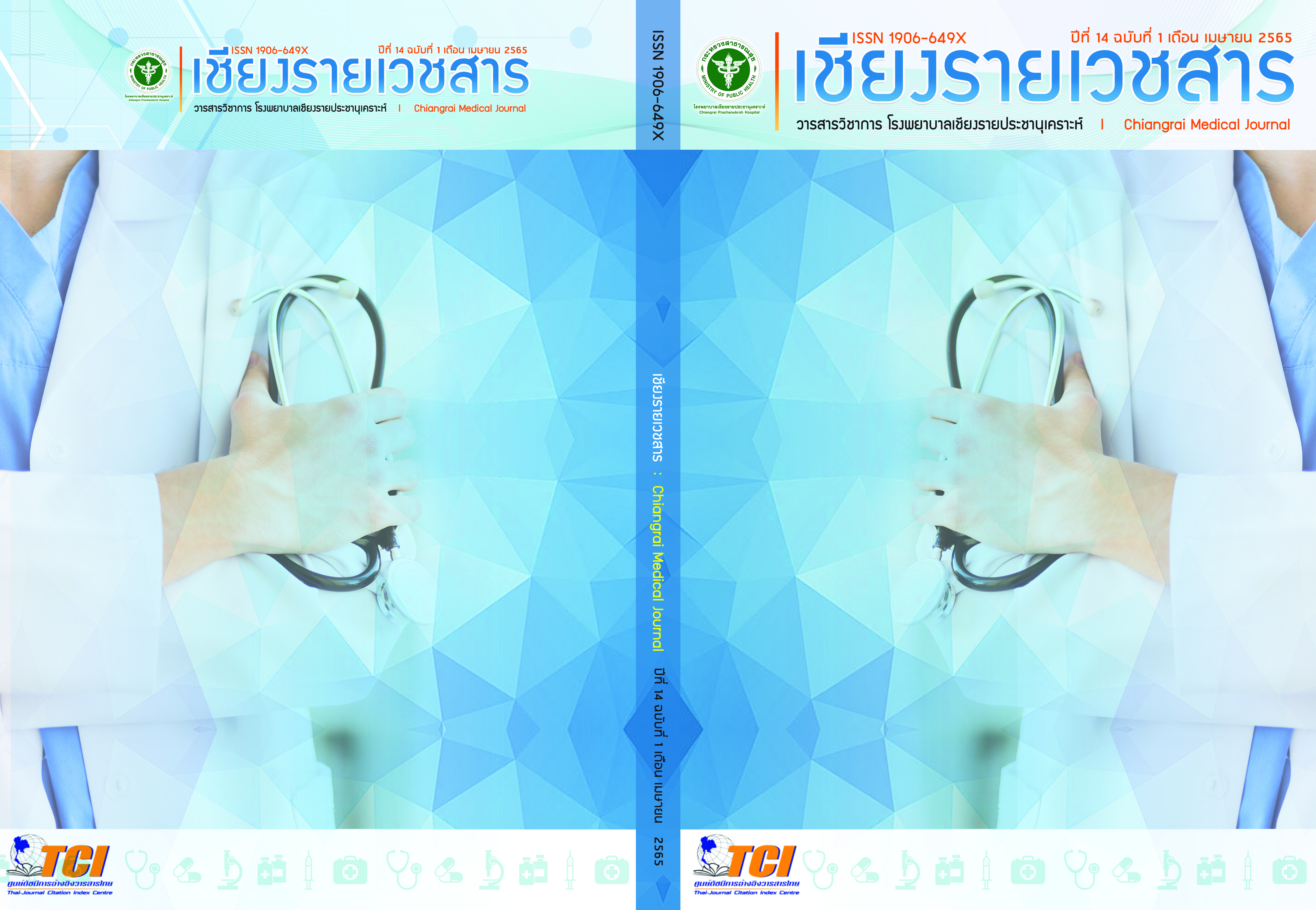การคัดกรองและป้องกันภาวะซึมเศร้าในผู้จะเป็นบิดา: บทบาทพยาบาล
Main Article Content
บทคัดย่อ
การปรับตัวสู่บทบาทการเป็นบิดา อาจทำให้ผู้จะเป็นบิดาเกิดความรู้สึกขัดแย้งในการปรับบทบาท ขาดความมั่นใจในตนเอง เกิดการเปลี่ยนแปลงทั้งด้านร่างกายและจิตใจ จนเกิดเป็นอารมณ์เศร้า และพัฒนาเป็นภาวะซึมเศร้า โดยภาวะซึมเศร้าของผู้จะเป็นบิดามีแนวโน้มเพิ่มขึ้นทั่วโลก สำหรับประเทศไทย พบร้อยละ 13.4 ในภรรยาที่มีอายุครรภ์ 28 สัปดาห์ขึ้นไป ปัจจัยที่เกี่ยวข้องกับภาวะซึมเศร้าประกอบด้วย ปัจจัยส่วนบุคคลของผู้จะเป็นบิดา ปัจจัยด้านคู่สมรสและการตั้งครรภ์ ปัจจัยด้านจิตสังคม และปัจจัยด้านชีวภาพ ผู้จะเป็นบิดาที่มีภาวะซึมเศร้า จะมีอาการอ่อนเพลีย ความสนใจทางเพศลดลง มีการเปลี่ยนแปลงความอยากอาหาร มีปัญหาการนอนหลับ รู้สึกแยกตัว ดื่มสุราหรือใช้สารเสพติด มีความคิดและพฤติกรรมฆ่าตัวตาย ภาวะซึมเศร้าดังกล่าวจะส่งผลกระทบต่อผู้จะเป็นบิดาทั้งด้านร่างกายและจิตใจ ส่งผลกระทบต่อสตรีมีครรภ์ ทารกในครรภ์และทารกแรกเกิด ดังนั้นพยาบาลจึงมีบทบาทในการคัดกรองภาวะซึมเศร้าของผู้จะเป็นบิดา โดยการซักประวัติ การประเมินภาวะซึมเศร้า และการตรวจทางห้องปฏิบัติการ รวมถึงป้องกันภาวะซึมเศร้าโดยการให้การสนับสนุนช่วยเหลือผู้จะเป็นบิดาในด้านอารมณ์ ด้านการประเมินค่า ด้านข้อมูลข่าวสาร และด้านการเงิน สิ่งของและบริการ เพื่อให้ผู้จะเป็นบิดาสามารถปรับตัวสู่บทบาทการเป็นบิดาได้อย่างเหมาะสม
Article Details

อนุญาตภายใต้เงื่อนไข Creative Commons Attribution-NonCommercial-NoDerivatives 4.0 International License.
เอกสารอ้างอิง
Suparb S. Sociology. 6th ed. Bangkok: Thai Watana Panich; 2002.
Beck AT. Depression: clinical experimental and theoretical aspects. New York: Floeber Medical Division; 1967.
Escribè-Agüir V, Gonzalez-Galarzo MC, Barona-Vilar C, Artazcoz L. Factors related to depression during pregnancy: are there gender differences?. J Epidemiol Community Health. 2008;62(5):410-4.
Da Costa D, Zelkowitz P, Dasgupta K, Sewitch M, Lowensteyn I, Cruz R, et al. Dads get sad too: depressive symptoms and associated factors in expectant first-time fathers. Am J Mens Health. 2017;11(5):1376-84.
Koh YW, Chui CY, Tang CS, Lee AM. The prevalence and risk factors of paternal depression from the antenatal to the postpartum period and the relationships between antenatal and postpartum depression among fathers in Hong Kong. Depress Res Treat. 2014; 2014: 1-11.
Tokumitsu K, Sugawara N, Maruo K, Suzuki T, Yasui-Furukori N, Shimoda K. Prevalence of perinatal depression among Japanese men: a meta-analysis. Ann Gen Psychiatry. 2020;19(1):65.
Rutchanapagit S, Roomruangwong C. Prevalence and associated factors of antenatal depression among fathers at King Chulalongkorn Memorial Hospital. Chula Med J. 2013;57(4):515-28.
Post and Antenatal Depression Association (PANDA). Perinatal anxiety & depression in men [Internet]. 2017 [cited 2021 Dec 24]. Available from: http://www.panda.org.au.
Spector AZ. Fatherhood and depression: a review of risks, effects, and clinical application. Issues Ment Health Nurs. 2006t;27(8):867-83.
Thailand Development Research Institute. The COVID-19 impact on vulnerable families: families with young children [Internet]. 2020 [cited 2022 Jan 5]. Available from: https://www.unicef.org/thailand/media/6206/file/COVID-19%20Impact%20on%20young%20children.pdf.
Boyce P, Condon J, Barton J, Corkindale C. First-Time Fathers' Study: psychological distress in expectant fathers during pregnancy. Aust N Z J Psychiatry. 2007;41(9):718-25.
Kim P, Swain JE. Sad dads: paternal postpartum depression. Psychiatry (Edgmont). 2007;4(2):35-47.
Sriarporn P, Suntornlimsiri N, Juntratit K, Deeluea J, Nunchai J, Khiaokham P. Factors related to postpartum depression among first time mothers and fathers. Nursing Journal. 2015;42(3):37-50.
Nunchai J, Sriarporn P, Chareonsanti J. Factors related to depression among Thai fathers. Nursing Journal. 2016:43(Suppl):59-70.
Goodman JH. Paternal postpartum depression, its relationship to maternal postpartum depression, and implications for family health. J Adv Nurs. 2004;45(1):26-35.
Wee KY, Skouteris H, Pier C, Richardson B, Milgrom J. Correlates of ante- and postnatal depression in fathers: a systematic review. J Affect Disord. 2011;130(3):358-77.
Ramchandani PG, Psychogiou L, Vlachos H, Iles J, Sethna V, Netsi E, et al. Paternal depression: an examination of its links with father, child and family functioning in the postnatal period. Depress Anxiety. 2011;28(6):471-7.
Radolff LS. The CES-D scale: a self-report depression scale for research in the general population. Journal of Applied Psychological Measures. 1977;1:385–401
Wells VE, Klerman GL, Deykin EY. The prevalence of depressive symptoms in college students. Social Psychiatry. 1987;22:20–8.
Radloff LS. The use of the Center for Epidemiologic Studies Depression Scale in adolescents and young adults. J Youth Adolesc. 1991;20(2):149-66
Kuptniratsaikul V, Pekuman P. The study of the Center for Epidemiologic Studies-Depression Scale (CES-D) in Thai people. Siriraj Hosp Gaz;49(5):442-8.
Cox JL, Holden JM, Sagovsky R. Detection of postnatal depression. Development of the 10-item Edinburgh Postnatal Depression Scale. Br J Psychiatry. 1987;150:782-6.
House JS. Work stress and social support. Reading, Mass: Addison-Wesley; 1981.
Department of Health: Ministry of Public Health. Sookjai daipenphor. Nonthaburi: Bureau of Reproductive Health, Department of Health: Ministry of Public Health; 2011.


